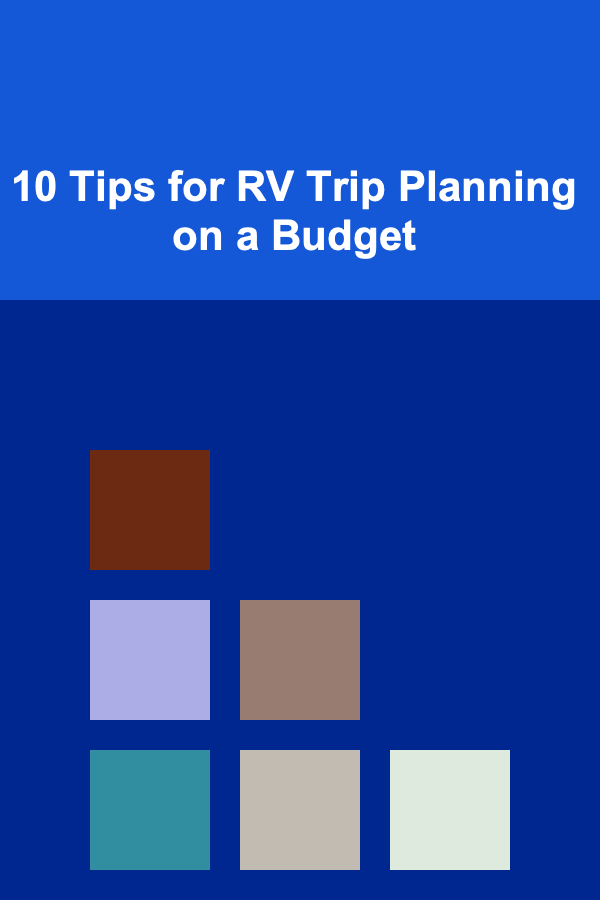
10 Tips for RV Trip Planning on a Budget
ebook include PDF & Audio bundle (Micro Guide)
$12.99$10.99
Limited Time Offer! Order within the next:

Planning an RV trip on a budget is not only a fun and rewarding experience, but it can also be a way to explore new destinations while saving money. Whether you're planning a short weekend getaway or an extended cross-country adventure, there are plenty of strategies to reduce costs and make the most of your RV vacation. By carefully considering factors like route selection, accommodation, meals, and activities, you can ensure a memorable trip without breaking the bank.
This article outlines 10 essential tips for planning an RV trip on a budget, with advice that can help you maximize your savings while ensuring a comfortable, enjoyable experience.
Choose the Right RV Rental or Purchase
Why It Matters:
The type of RV you choose has a significant impact on both the cost of the trip and your overall comfort. If you don't own an RV, you'll need to rent one, and selecting the right RV is key to staying within budget. Renting an RV offers flexibility, but if you plan on taking multiple trips, purchasing an RV could eventually save you money in the long term.
Tips for Implementation:
- Rent vs. Buy: Renting an RV can be more economical for a short-term trip, but if you're planning long-term or frequent travel, purchasing a used RV could be more cost-effective. Consider the overall costs, including insurance, maintenance, and storage when deciding between renting or buying.
- Size and Features: Larger RVs with more amenities tend to cost more to rent or purchase. If you're traveling with a small group or solo, consider renting or buying a smaller, more fuel-efficient RV to reduce costs on both rental and fuel.
- Research Discounts: Look for special deals, discounts, or loyalty programs offered by RV rental companies. Booking in advance often allows for savings, and some companies provide seasonal promotions.
What to Look For:
- Choose an RV that fits your needs and the number of people traveling with you.
- Ensure it has essential amenities like a comfortable bed, kitchenette, and bathroom, but avoid unnecessary luxury features that will increase the cost.
Plan Your Route Efficiently
Why It Matters:
Route planning can significantly influence the cost of your RV trip. Long detours, heavy traffic, and fuel-guzzling routes can quickly add up, so it's essential to optimize your travel route.
Tips for Implementation:
- Avoid High-Traffic Areas: Busy highways and popular tourist destinations can lead to delays and increased fuel consumption. Plan alternative routes that avoid major cities or congested areas, especially during peak travel times.
- Use RV-Specific Route Planners: Many apps and websites cater specifically to RV travelers, providing information on RV-friendly routes, rest stops, and fuel-efficient paths. These tools can help you avoid low bridges or narrow roads that may not accommodate larger RVs.
- Consider Fuel Costs: Plan your route based on the distance between gas stations and RV-friendly fuel stops. Also, avoid routes that require excessive backtracking, which could drive up fuel expenses.
What to Look For:
- Minimize driving time and fuel costs by selecting the most efficient route.
- Take into account the type of RV you have and its suitability for certain roads and routes.
Camp for Free or Low-Cost
Why It Matters:
Camping fees can eat into your budget, especially if you're staying at private campgrounds or RV parks. Fortunately, there are several ways to camp for free or at a lower cost, which can help you save a substantial amount of money on your trip.
Tips for Implementation:
- Use Public Land: Many national forests, Bureau of Land Management (BLM) lands, and state parks offer free or low-cost camping options. Check local regulations to see if camping is allowed, and make sure to follow Leave No Trace principles.
- Campground Memberships: Organizations like Good Sam, Passport America, and Thousand Trails offer discounts at participating campgrounds for members. A membership might pay for itself in a few nights' stay, especially for long trips.
- Boondocking: Boondocking, or camping without hookups, can be an excellent way to save money. Many RVers enjoy camping in remote areas, such as deserts, mountains, or lakesides, without the need for paid facilities.
What to Look For:
- Look for free camping options or discounted rates through memberships.
- Prioritize campsites that offer basic amenities like water and restrooms if needed, but avoid expensive amenities like Wi-Fi and pools.
Use Discounted Fuel
Why It Matters:
Fuel costs are one of the biggest expenses when traveling in an RV, so finding ways to save on fuel can have a significant impact on your overall trip budget.
Tips for Implementation:
- Join Fuel Discount Programs: Many gas stations and truck stops offer discounts for RV owners and long-distance travelers. For example, programs like the Pilot Flying J's myRewards or Love's Travel Stops offer discounts on fuel and additional perks for members.
- Use Apps for Fuel Prices: There are apps like GasBuddy that allow you to compare fuel prices in real-time across different gas stations along your route, so you can choose the most affordable option.
- Fill Up at Truck Stops: Truck stops often have lower fuel prices than regular gas stations, especially in rural areas. Many of these stops cater to RVers and have larger fueling areas, making it easier to fill up.
What to Look For:
- Find the best fuel discounts along your route.
- Take advantage of loyalty programs that offer ongoing savings.
Plan Simple and Budget-Friendly Meals
Why It Matters:
Food can be another major expense during your RV trip, especially if you're dining out frequently. Cooking your own meals can save you money, but you need to plan carefully to avoid waste and excess.
Tips for Implementation:
- Stock Up Before You Go: Purchase non-perishable items like canned goods, pasta, and rice before your trip to avoid paying inflated prices at tourist locations. This also ensures you have enough food for the duration of your trip without the temptation to eat out.
- Use the RV Kitchen: Most RVs come with a small kitchen, so make full use of it to cook simple and affordable meals. Invest in a small grill or a portable stove to make cooking more versatile.
- Plan for Local Farmers Markets: Whenever possible, shop at local farmers markets for fresh, affordable produce. Many of these markets offer great deals, especially if you shop at the end of the day.
What to Look For:
- Plan meals that are easy to prepare, using simple ingredients that don't take up much space.
- Stick to a grocery budget and avoid impulse buys at expensive tourist locations.
Avoid Peak Travel Seasons
Why It Matters:
Traveling during peak season, such as summer, holidays, or school vacations, often leads to higher prices for campgrounds, attractions, and even fuel. By avoiding peak travel times, you can save money on nearly every aspect of your RV trip.
Tips for Implementation:
- Travel Off-Season: If possible, plan your trip during the shoulder seasons (spring or fall) when campgrounds and RV parks offer lower rates. This also allows you to avoid crowds and enjoy more peaceful destinations.
- Book Early for Peak Seasons: If you must travel during a busy season, book your campsites and RV parks well in advance to secure lower rates and avoid last-minute price hikes.
- Consider Weekday Travel: Weekends at popular tourist destinations can lead to inflated prices. Plan your travel around weekdays for cheaper rates at campgrounds and fewer crowds at attractions.
What to Look For:
- Travel during less popular times to avoid higher prices and crowded areas.
- Book ahead if you must travel during peak season.
Take Advantage of Free or Low-Cost Activities
Why It Matters:
Entertainment and activities are another area where costs can quickly spiral out of control. Fortunately, there are numerous free or low-cost activities that can make your RV trip just as exciting without draining your budget.
Tips for Implementation:
- Hiking and Nature Walks: Many national parks, state parks, and forests offer free or low-cost access to hiking trails, wildlife watching, and nature walks.
- Visit Free Museums and Landmarks: Check for free or low-cost admission days for museums, historical landmarks, and art galleries. Many cities and towns offer free access to public attractions.
- Geocaching: Geocaching is a fun, free outdoor activity that involves searching for hidden treasures using GPS coordinates. It's a great way to explore new areas while adding adventure to your trip.
What to Look For:
- Seek out outdoor activities that allow you to enjoy nature at no cost.
- Take advantage of free days or local discounts for attractions.
Maintain the RV Yourself
Why It Matters:
Routine maintenance and unexpected repairs can add up quickly, but performing simple maintenance tasks yourself can save a lot of money. Keeping your RV in good working condition is key to avoiding costly breakdowns and ensuring a smooth trip.
Tips for Implementation:
- Check the RV Before Departure: Perform a pre-trip inspection to check the tires, oil, brakes, and battery. This can help prevent issues on the road and save you from costly repairs later.
- Learn Basic RV Maintenance: Many RVers find it helpful to learn how to perform basic repairs, such as fixing leaks, replacing fuses, and maintaining the propane system. There are many online resources and YouTube tutorials available for beginners.
- Carry Emergency Tools: Having a toolkit with essential tools can help you address minor issues on the road without needing to call for expensive roadside assistance.
What to Look For:
- Learn simple maintenance techniques to keep your RV in top shape.
- Keep essential tools on hand for emergencies.
Use Solar Power When Possible
Why It Matters:
Solar power can help you reduce the cost of electricity on your RV trip. While some RV parks charge for hookups, using solar panels to power lights, electronics, and appliances can help you save money.
Tips for Implementation:
- Install Solar Panels: Invest in portable or fixed solar panels to generate electricity while on the road. Even a small solar setup can power essential devices like lights and phone chargers.
- Portable Solar Chargers: If you're just getting started with solar energy, a portable solar charger can be a cost-effective option for charging small devices like phones, laptops, and cameras.
- Monitor Power Usage: Be mindful of your energy consumption. By using energy-efficient appliances and turning off devices when not in use, you can extend your battery life and make the most of your solar power.
What to Look For:
- Invest in a basic solar power system that fits your needs and reduces reliance on campground hookups.
- Ensure you understand your RV's power requirements and the capacity of your solar system.
Travel with Friends or Family
Why It Matters:
Traveling with others can help you share costs and reduce the financial burden of your RV trip. Splitting expenses like fuel, campground fees, and meals can make the trip more affordable for everyone involved.
Tips for Implementation:
- Split Costs: Share the cost of the RV rental or fuel with friends or family. This makes the trip more affordable for everyone and allows you to enjoy the experience together.
- Coordinate Meals: Planning and preparing meals together can save money and provide an opportunity for bonding. You can take turns cooking and buying groceries in bulk.
- Share Duties: Having multiple people on board means you can share driving, cooking, and campsite setup duties, making the trip less stressful and more cost-effective.
What to Look For:
- Look for travel partners who share similar interests and budget goals.
- Be clear about how costs will be split before starting the trip.
By following these 10 tips, you can plan an exciting and affordable RV trip without breaking the bank. With thoughtful planning and a few smart strategies, you can enjoy the freedom and adventure of RV travel while keeping costs under control. Whether you're traveling solo, with friends, or with family, there's no reason your RV trip can't be both fun and budget-friendly.
Reading More From Our Other Websites
- [Hiking with Kids Tip 101] How to Choose the Right Kid-Friendly Hike: Tips, Gear, and Safety Hacks
- [Home Staging 101] How to Use Online Resources for Home Staging Ideas
- [Polymer Clay Modeling Tip 101] How to Produce Durable, Weather‑Resistant Outdoor Polymer Clay Sculptures
- [Home Family Activity 101] How to Start a Family Book Club for All Ages
- [Organization Tip 101] How to Organize Recipes in a Digital Cookbook Format
- [Personal Care Tips 101] How to Remove Nail Polish Stains From Your Clothes and Furniture
- [Home Rental Property 101] How to Handle Difficult Tenants with Grace
- [Home Cleaning 101] How to Unclog and Disinfect Your Kitchen Sink Drain: Beyond the Surface of How to Clean a Kitchen Sink
- [Ziplining Tip 101] From Height to Heart: Integrating Mindfulness Practices into Your Zipline Adventure
- [Organization Tip 101] What Tools Can Help You Organize Your Kitchen Efficiently?

Becoming a Cloud Engineer: Key Strategies for Optimizing Cloud Architecture
Read More
How to Create a Family Vision Board Together
Read More
How to Develop Large-Scale Solar Farms
Read More
How to Install an Effective Home Security Alarm System
Read More
How To Master Acoustic Guitar Strumming
Read More
How To Grasp the Progress in HIV/AIDS Treatment
Read MoreOther Products

Becoming a Cloud Engineer: Key Strategies for Optimizing Cloud Architecture
Read More
How to Create a Family Vision Board Together
Read More
How to Develop Large-Scale Solar Farms
Read More
How to Install an Effective Home Security Alarm System
Read More
How To Master Acoustic Guitar Strumming
Read More